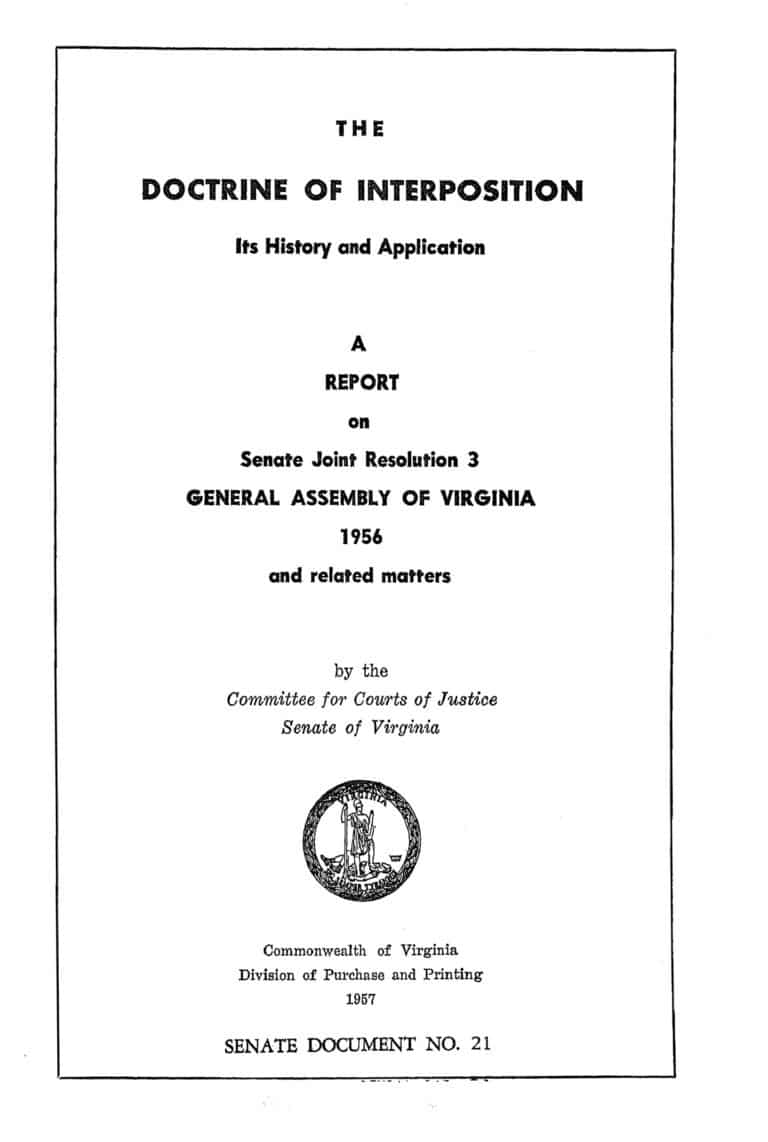RESOURCES
DOCUMENTS
Doctrine of Interposition
1956
Interposition is the idea that a state has the right to “interpose” itself between the federal government and the people of the state if it believes the federal government has exceeded its constitutional authority. It stems from the 10th Amendment and was first articulated in the late 18th century by James Madison and Thomas Jefferson in the Virginia and Kentucky Resolutions of 1798, in opposition to the Alien and Sedition Acts.However, it has no legal basis under the U.S. Constitution and has repeatedly been rejected by the courts.
As part of the strategy of Massive Resistance, the Virginia General Assembly passed a resolution of interposition in 1956, declaring that the Supreme Court had overstepped its authority in Brown and that the state would interpose itself to prevent the enforcement of the ruling.
…this unwarranted exercise of power by the Supreme Court of the United States threatens to destroy the reserved powers of the States, including the power to regulate public education, and to establish and maintain separate schools for the white and colored races…
— Doctrine of Interposition
Interposition was used as a pseudo-legal justification for ignoring or obstructing federal desegregation mandates, but:
• It was struck down by federal courts as unconstitutional
• The Supreme Court reaffirmed federal supremacy in cases such as Cooper v. Aaron (1958), stating that states could not nullify federal law or Supreme Court decisions
• The policy ultimately collapsed in the early 1960s after a series of court rulings, public backlash, and federal intervention.
The following is an excerpted transcription of the Virginia General Assembly’s Resolution of Interposition, adopted on February 24, 1956:
RESOLUTION MEMORIALIZING THE CONGRESS OF THE UNITED STATES THAT THE COMMONWEALTH OF VIRGINIA INTERPOSES TO THE DECISION OF THE SUPREME COURT OF THE UNITED STATES IN THE PUBLIC SCHOOL CASES DECIDED ON MAY 17, 1954.
Whereas, the Supreme Court of the United States, on May 17, 1954, in the case of Brown et al. v. Board of Education of Topeka et al., rendered a decision which is contrary to the Constitution of the United States and to the decisions of that Court for a period of more than seventy-five years immediately prior thereto; and
Whereas, this unwarranted exercise of power by the Supreme Court of the United States threatens to destroy the reserved powers of the States, including the power to regulate public education, and to establish and maintain separate schools for the white and colored races; and
Whereas, the Constitution of the United States confers no power upon the federal government or any of its agencies to regulate or control the operation of public schools, which is a function exclusively reserved to the several States; and
Whereas, the Constitution of the United States is a compact among the several sovereign States, and each State has the right to interpose for itself in case of a deliberate, palpable, and dangerous exercise of other and undefined powers by the federal government;
Now, therefore, be it resolved by the House of Delegates, the Senate concurring:
1. That the General Assembly of Virginia, on behalf of the people of the Commonwealth, does hereby declare and affirm that the decision of the Supreme Court of the United States in the case of Brown v. Board of Education is unconstitutional, and is, therefore, null and void and of no effect.
2. That the Commonwealth of Virginia hereby interposes between the Supreme Court of the United States and the people of this State, and declares that the decision is not binding on the citizens of Virginia.
3. That the Congress of the United States be memorialized to take appropriate action to protect the rights of the States and of the people under the Constitution.
4. That copies of this resolution be sent to the President of the United States, the Vice President, the Speaker of the House, and each member of the Virginia delegation in Congress.
